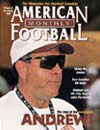AMERICAN FOOTBALL MONTHLY THE #1 RESOURCE FOR FOOTBALL COACHES
Article CategoriesAFM Magazine
|
Mickey Andrews\' SecretFlorida State\'s defensive coordinator didn\'t rise to the top by being a nice guy, but rumor has it he is one anyway.by: Jane Musgrave © More from this issue Wickey Andrews doesn't mince words when talking about Florida State's early-season loss to Miami, a defeat that hung over the Seminoles like the state's ever-present humidity, threatening to wash away their hopes for a second consecutive national championship. "It was a mistake on my part," he offers even though the question isn't on the table. "My biggest mistake was I didn't play more kids than I did. I had kids that played almost the entire game. By the end, they were pooped." Andrews' willingness to accept responsibility for the loss and blame it on his decision to deviate from his trademark empty-the-bench game plan is typical say those who have coached with him and against him. While Florida State's defensive coordinator is best known for his bombastic on-the-field demeanor, his breakneck competitiveness a....The full article can only be seen by subscribers.
|
|
|||||||
| HOME |
MAGAZINE |
SUBSCRIBE | ONLINE COLUMNISTS | COACHING VIDEOS |
Copyright 2025, AmericanFootballMonthly.com
All Rights Reserved





